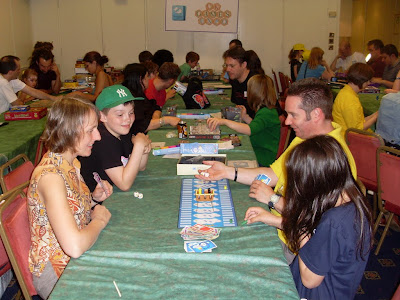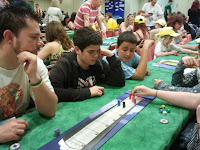Winner of the 2011 Spiel des Jahres prize
Qwirkle is a brilliantly simple game we have been using for years that received the ultimate gaming accolade, the German award
Spiel des Jahres (an award for excellently designed family games) on the 27th June 2011. In many respects this is a surprise award as it is not a German and is an abstract game. This is unusual although not unheard but is a very different game to those more popular with gamers such as Dominion, El Grande etc but is arguably much more of a family game that will appeal to a wide audience, just not necessarily gamers! It has perhaps more in common with the little known tactile winner
Villa Palletti (another game we use at times) from 2002.
At
Imagination Gaming we use
Qwirkle because:
1. It is popular with everybody we use it with and very versatile.
2. The rules can be taught and understood in a minute, maybe two.
3. Its ability to support maths through basic mental arithmetic, as the scores are built up, as well as colour and pattern recognition makes it a good tool in primary schools.
4. Its tactile nature and colourful patterns (although the blue & purple could be more clearly differentiated) on stark black somehow give it a relaxing and calming feel as the game progresses building into an attractive mosaic.
5. It offers simple tactical decisions that ensure each game develops very differently, so giving it a lot of re-playability.
6. It has some similarities to Dominoes and so is assessable to those nervous of modern games particularly the older generations, whilst the qualities already mentioned means it also appeals to those of younger years, grandchildren in particular; so it works well with intergenerational groups.
7. It comes in a cloth bag that together with the wooden pieces makes it a good game to throw in the car and play with kids whilst waiting at tables or out for the day rather than turning to the more common technology distractions.
Having already won a number of accolades the Spiel des Jahres rosette can only ensure that its visibility is raised globally and maybe even in the UK!






